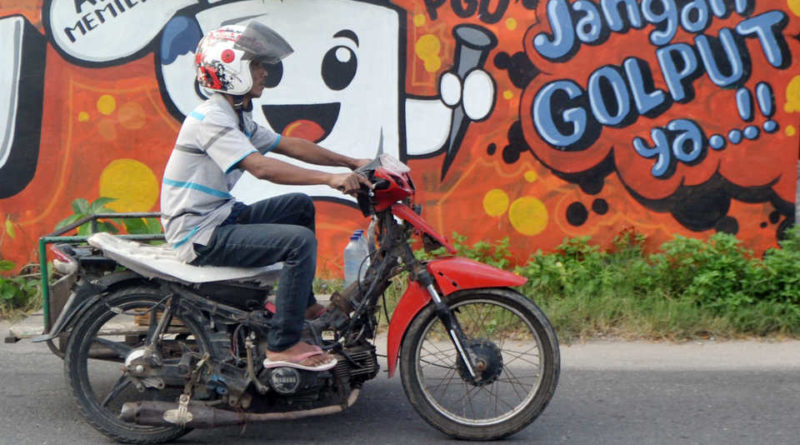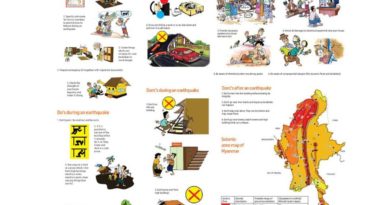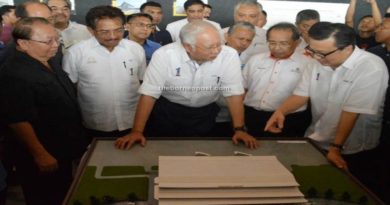OP-ED: JAKARTA- The Debate That Showed Jokowi and Prabowo Are Just More of the Same – By Max Lane
Jakarta. The second televised debate between Indonesia’s two presidential contenders, the incumbent Joko “Jokowi” Widodo and his challenger, Prabowo Subianto, on Feb. 17 primarily focused on economic issues. But as a debate on economic policies, it was rather lackluster and relatively uninteresting.
The dynamic of the duel involved more image building rather than policy discussion. In this framework, Jokowi concentrated on case data regarding policy implementation over the past four years. Prabowo, while occasionally referring to cases he came across during his campaign tours, concentrated on asserting that he had a different development philosophy. He emphasized national sovereignty and the prioritization of local over foreign, although with no substantial examples. To be fair to both contenders, the format of two-minute and one-minute statements must also have been a constraining factor.
.
.
ADS by Cloud 9:
– SPACE RESERVE FOR YOUR ADVERTISEMENT –
.
.
Despite – or perhaps because of – the shallowness of the contestation, the debate did have a significant impact on one trend among one identifiable sector of the political public. A survey by the Big Data Analytics Laboratorium at Yogyakarta’s Gajah Mada University noted an escalation in discussions on golput, or a conscious decision not to vote, following the debate. It is clear from even minimal ongoing exposure to social media that there was a strong reaction to elements in the debate among those already committed to, or leaning toward staying away from the polls.
There were two major elements in the debate that provoked these responses, both relating to statements by Jokowi. It should be noted that those actively advocating for staying away from the polls tend to come from a section of people who previously supported or at least had been sympathetic toward Jokowi. The first of these statements was that during his tenure, there had been no land disputes involving the acquisition of land for development and that those who had to move had not only received ganti rugi(compensation for losses incurred) but rather ganti untung (literally compensation that was profitable, i.e. beyond simply making up for their loss.)
.
.
ADS by Cloud 9:
– SPACE RESERVE FOR YOUR ADVERTISEMENT –
.
.
This statement has met a barrage of counter-information, mainly from nongovernmental organizations and activists who have been working with villagers expelled from their land. One of the strongest and most widely circulated rebuttals was by the Agrarian Renewal Consortium (KPA). It asserted that there had been 244 cases of land conflict, which involved criminal charges against 940 villagers, while more than 50 had been shot – at least 40 of them fatally. The conflicts included private and state-owned companies and institutions. Vivid social media memes, including footage of villagers crying as their homes were being bulldozed, and other physical confrontations, were very common.
The second statement was that under his government, there had been no forest burning. This was also quickly rebutted by environmental groups, which provided data showing that while the incidences of such cases had been reduced, it had not stopped. A government spokesperson later amended Jokowi’s original assertion.
The sentiment associated with these rebuttals, and their wide circulation on social media, was one of golput, expressing frustration and anger with Jokowi for what this section of the public saw as being untrue. It strengthened the sentiment among these people that Jokowi could not be counted as a reformer.
The second instance of a statement by Jokowi that sparked a substantial response came later in the debate, when he made a reference to Prabowo’s extensive land holdings in Sumatra and Kalimantan, which he said amounted to an area larger than Greater Jakarta. Prabowo later responded that these holdings were based on land-use rights, not actual ownership and that it can be returned to the state at any time. He added that it was still better if he held it rather than a foreign entity – echoing his general line of attack that Jokowi favored foreign business interests.
.
.
ADS by Cloud 9:
– SPACE RESERVE FOR YOUR ADVERTISEMENT –
.
.
Jokowi’s raising of Prabowo’s landholdings did provide ammunition for those campaigning against the former Army general. There was a sudden surge of social media memes and attacks depicting Prabowo as the big landlord only pretending to care about the common people. However, this was not the only response. There was also a surge in reports in the media and on the internet, listing the huge landholdings of other wealthy persons, including several key members of Jokowi’s cabinet and his campaign team. These included the senior minister, Luhut Panjaitan, and the manager of Jokowi’s campaign team, Erick Thohir – to name just two. There was also data provided on others in the Prabowo camp. There was vigorous debate about the amount and the status of the land allegedly owned by different personalities. There have even been demands that the relevant government departments release all official data.
.
.
ADS by Cloud 9:
– SPACE RESERVE FOR YOUR ADVERTISEMENT –
.
.
Despite these debates, for the section of the political public leaning towards golput, this surge of data reinforced the impression that both contenders were representatives of the same kind of extremely wealthy elite. Confirming this impression was also a statement by Vice President Jusuf Kalla, a Jokowi supporter, that it was he, while still a minister in an earlier government, who approved Prabowo’s purchase of the usage rights to large swathes of land in Kalimantan and Aceh.
The Big Data Analytics Laboratorium survey confirmed the escalation of the discussion and advocacy of golput on social media. But it is still impossible to assess to what extent this sentiment has spread to the broader public. What is clear, is that a golput sentiment is congealing in what might be hesitantly labeled an emerging left-wing of civil society, which consists of nongovernmental organizations and campaign groups focusing on social justice and human rights. This sector has divided into those defending Jokowi and those highly critical of his record in government: there is a split in this sector. To what extent this division is impacting the grassroots cannot be assessed yet.
.
.
ADS by Cloud 9:
– SPACE RESERVE FOR YOUR ADVERTISEMENT –
.
.
However, the brief exchange between Jokowi and Prabowo around the issue of the latter’s landholding was importantly revealing of how Jokowi sees himself and who he represents. After Prabowo’s initial response to Jokowi’s reference to his massive landholdings, Jokowi felt it necessary to interrupt the formal flow of dialogue to re-state that his government never made any such large grants, only small grants. While the furor around the huge landholdings of Jokowi backers underlined that big money is an important part of his coalition, most of them small and medium capitalists who make up the leadership layers, especially at district level, of all the parties that support him. Jokowi makes a lot, publicity-wise, of his children running businesses that sell martabak (Indonesian fast-food omelets) and banana fritters. These two items are culinary symbols of the lower class, rather than the elite. It may have been his desire to strengthen his appeal among middle-class capitalists that led him to raise the issue of Prabowo’s landholdings, which in turn led to everybody’s landholdings becoming public.
Max Lane is an author and researcher with decades of experience in Indonesia. He is the translator of Pramoedya Ananta Toer‘s “Buru Quartet.” He lives in Yogyakarta.
.
.
ADS by Cloud 9:
– SPACE RESERVE FOR YOUR ADVERTISEMENT –
.
.
ADS by Cloud 9:
– SPACE RESERVE FOR YOUR ADVERTISEMENT –
.

All photographs, news, editorials, opinions, information, data, others have been taken from the Internet ..aseanews.net | [email protected] |.For comments, Email to :D’Equalizer |









